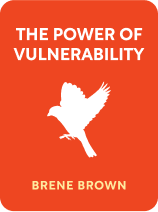

This article is an excerpt from the Shortform book guide to "The Power Of Vulnerability" by Brené Brown. Shortform has the world's best summaries and analyses of books you should be reading.
Like this article? Sign up for a free trial here .
Why do we feel shame? What are some healthy methods of handling shame and how can Brené Brown’s advice help?
In her TED Talk The Power of Vulneraility, Brené Brown discusses what causes shame, how shame develops from childhood, and provides five methods for handling shame. Only when you overcome shame can you start to embrace wholehearted living.
Continue reading for Brené Brown’s discussion about shame.
Brené Brown on Shame
Why do we feel shame? According to Brené Brown’s TED talk, shame is insecurity that attaches to self-identity and gets in the way of action or vulnerability. It causes people to believe that they’re unworthy or unloveable. For example, if you feel shame about the way you look, and someone rejects you romantically, you may believe that you’re not “attractive enough,” diminishing your self-worth in the process.
Shame relies on people believing that their experience with insecurity is unrelatable, creating a sense of loneliness. This often causes people to believe that no one else could possibly understand their situation, leading to the development of three factors that allow shame to grow: secrecy, silence, and judgment.
For example, a common form of shame is known as “imposter syndrome,” or the feeling that you’re a fraud. Imposter syndrome requires that you believe that the people around you are more qualified than you are and can’t understand your insecurity. This may lead you to keep your fears to yourself (silence), prevent others from seeing any potential weaknesses (secrecy), and increase your awareness of the failures of others (judgment).
Though shame feels isolating, everyone experiences it (with the exception of severe psychopaths). While no one wants to share their insecurities, talking about shame is the only way to diminish its power because, once you know that you’re not alone, shame loses its leverage.
Common Causes of Shame
Shame often develops in childhood and lingers throughout adulthood. The roots of shame are often built at home or at school as a result of interactions with authority figures such as teachers or parents. For example, if a teacher calls a student “stupid” in front of the class for forgetting to put their name on their paper, that student may develop shame around their intelligence.
One study showed that 85% of people feel the impact of being shamed in school. Of those people, half of them were shamed for their creativity (or lack thereof). This has caused many to avoid creativity well into their adult years, causing what many in the business world are calling an “innovation crisis.”
In addition to negative interactions with teachers and parents, negative interactions with siblings often cause shame. Siblings know each other’s triggers and often abuse that knowledge through name-calling, physical abuse, and other cruel practices. These often occur during fights and are usually outlets for unrelated anger.
For example, if Johnny had a rough day at school, and his sister, Kelly, makes a joke at his expense, Johnny may make a cruel comment about Kelly’s appearance in retaliation. If self-image is something that Kelly struggles with, this comment could feed into her shame and drive her deeper into her insecurity.
Shame Triggers
Shame triggers are topics that evoke emotional responses based on your insecurities. These triggers are often the result of your upbringing and can elicit one of three negative responses:
- Silence: You say nothing and internalize your feelings. This leads to disconnection as you shut yourself off emotionally.
- Complacency: You people-please and overcompensate to pretend that nothing’s wrong. This causes disappointment as you succumb to the pressures of others.
- Aggression: You lash out and, often, shame other people in retaliation. This perpetuates and exacerbates shame culture.
For example, if you feel insecure about your body, and someone makes an off-hand comment about someone’s weight, you may feel an emotional response to their comment, leading you to do one of the following:
- You walk away and dive into your work. When people ask you what’s wrong, you say nothing. (Silence)
- You overcompensate by also making fun of the person your colleague was talking about. Later, you feel disappointment for commenting on someone else’s weight. (Complacency)
- You tell your colleague to back off, then make a comment about their appearance. Your colleague feels shamed and takes it out on someone else. (Aggression)
These triggers are often developed in childhood but carry on into adulthood. For example, if you were raised to believe that laziness is unacceptable, you may view taking breaks or getting sick as unacceptable because they keep you from working. This may cause you to make unhealthy decisions and overwork yourself to avoid your shame.
Handling Shame
Unfortunately, shame is a part of life. There isn’t a way to eradicate it, but you can deal with it healthily:
First, understand that self-worth has no prerequisites. You don’t have to do anything to be “worthy” of love and belonging. If you feel you have to prove yourself, you’re allowing your shame to dictate your behavior.
Second, when bad things happen, don’t allow them to dictate your self-worth. Don’t allow your guilt or humiliation to turn into shame. For example, if you make a bad decision, tell yourself, “I made a bad decision, and I’m working to fix it.” Conversely, avoid saying, “I am a bad person, and, because of that, I can’t fix anything.”
Third, accountability is important, but never at the cost of shaming. This applies to how you’re treated as well as how you treat others. For example, if your child gets a bad grade on a test, don’t shame them by calling them “lazy” or “dumb.” Instead, say, “I think you made some poor choices about studying, and I know you can do better because you’re smart, and you’re capable.”
This also applies to self-accountability. Your actions speak louder than your words, and if you resort to shaming yourself when you make mistakes, people around you will notice. For example, if you tell your children never to call themselves “stupid,” but you call yourself “stupid” after making simple mistakes, your children will note your hypocrisy and ignore your advice.
Fourth, practice shame resilience. Shame resilience is the ability to recognize and discuss shame. There are four keys to shame resilience:
- You’re willing to call shame, “shame.” Don’t try to bury or brush off your feelings as that will only lead to them coming back stronger due to repression.
- You know what you’re feeling ashamed about and you know what triggered it. For example, you may feel insecure about your intelligence after someone gives you feedback on your work.
- You can separate your reality from other people’s expectations. For example, if you struggle with being perceived as weak, the only way to deal with your shame is to accept that you can’t realistically live a healthy life while repressing or hiding your emotions to appear “strong.”
- You can reach out to people you trust and talk about your shame. These should be people who have earned your trust and who can bear the weight of your story. For example, if you’re feeling insecure about your body, you could call your best friend and talk through your shame.
Lastly, develop a few practices that help you identify and handle shame:
- Know your physical responses to shame. When you feel these responses, you know that you’re in shame and can work to handle it healthily.
- Practice authenticity. When you feel shame emerge, don’t overcompensate and don’t shrink away. Be true to yourself and know that you are enough.
- If you feel yourself spiraling, tap the center of your forehead. This helps engage the prefrontal cortex, which processes rational thinking.
- Take the time to process your emotions, especially in critical moments. Walk away for a moment if you need to. This helps you avoid habitually responding negatively to your shame.

———End of Preview———
Like what you just read? Read the rest of the world's best book summary and analysis of Brené Brown's "The Power Of Vulnerability" at Shortform .
Here's what you'll find in our full The Power Of Vulnerability summary :
- The 10 practices that you can use to embrace vulnerability and start living a wholehearted life
- Why thinking that you're never "enough" is dangerous
- The most common sources of shame and how to overcome them






